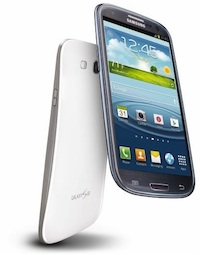Researchers from MWR Labs unveiled a zero-day attack against a Samsung Galaxy S3 smartphone last week during EUSecWest, which leveraged the device’s Near Field Communication (NFC) connection to gain full control over it.
While admittedly the NFC aspect was used for showmanship, the fact that it works means that anyone with a Galaxy S3 who happens to walk past an attacker is vulnerable to an attack. The limitation here is that the devices need to be in close proximity, but that is overcome in crowded areas or simply by bumping the intended victim.
 If successful, then that person’s SMS message database, pictures, email, and address book can be compromised. The attacker needs only upload the data to a remote server. In addition, the vulnerability yields total control, so it is possible to use it to call toll numbers.
If successful, then that person’s SMS message database, pictures, email, and address book can be compromised. The attacker needs only upload the data to a remote server. In addition, the vulnerability yields total control, so it is possible to use it to call toll numbers.
“MWR showed an exploit against a previously undiscovered vulnerability on a Samsung Galaxy S3 phone running Android 4.0.4. Through NFC it was possible to upload a malicious file to the device, which allowed us to gain code execution on the device and subsequently get full control over the device using a second vulnerability for privilege escalation. The same vulnerability could also be exploited through other attack vectors, such as malicious websites or e-mail attachments,” MWR Labs explained in a statement.
“Android 4.0.4 has many of the exploit mitigation features that are common to desktop Linux distributions, including Address Space Layout Randomisation (ASLR) and Data Execution Prevention (DEP). Shortcomings in these protections allowed us to leverage the control we had of the device to trigger the second vulnerability.”
A full report on the vulnerability will be released once Samsung has had time to prepare a fix. The flaw is also found in the Galaxy S2. For their work, MWR Labs walked away with a $30,000 prize. ZDI has taken possession of the exploit, and intends to disclose the specifics to Samsung.
In related news, Corey Benninger and Max Sobell of the Intrepidus Group were able to use NFC-enabled phones (Samsung Nexus devices) running a custom Android application to get free transit credits.
As part of their demo, it too given at EUSecWest, they explained how two cities using the MiFare Ultralight system had vulnerable NFC-enabled transit ticketing systems. While not all systems are vulnerable, the pair explained, the ones tested in New Jersey and San Francisco were.
“We know a number of cities are looking to roll out contactless technology and hope we can bring light to this issue so that it is implemented correctly in the future. One of the items we also raised in our talk is that full card emulation on smartphones is likely to happen soon. When this does, it could cause a number of NFC based access control systems to be re-evaluated,” they noted in a blog post.












